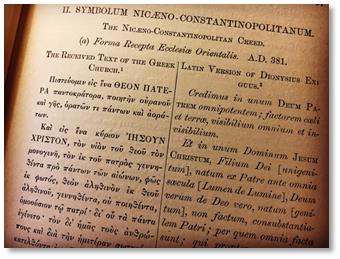It was about five hundred years ago that the Roman Catholic church excommunicated Martin Luther for the teachings that led to the Protestant Reformation. Chief among these teachings was the idea that justification is by faith alone (sola fide).
That is why it is baffling to read Pope Francis’s recent remarks about Luther. In a recent interview, a reporter asked the Pope if he might consider lifting Martin Luther’s excommunication. While the Pope did not offer to remove his excommunication, he did have some rather remarkable words. There is one particular paragraph worth highlighting:
I think that the intentions of Martin Luther were not mistaken. He was a reformer. Perhaps some methods were not correct. But in that time, if we read the story of the Pastor, a German Lutheran who then converted when he saw reality – he became Catholic – in that time, the Church was not exactly a model to imitate. There was corruption in the Church, there was worldliness, attachment to money, to power…and this he protested. Then he was intelligent and took some steps forward justifying, and because he did this. And today Lutherans and Catholics, Protestants, all of us agree on the doctrine of justification. On this point, which is very important, he did not err. He made a medicine for the Church…
This is a rather curious statement. Francis argues that Lutherans, Catholics, and Protestants all “agree on the doctrine of justification.” These words seem to suggest that the main soteriological difference between Protestants and Catholics is no longer an issue.
I have no idea what the Pope is talking about here. It is possible that The Joint Declaration on Justification is the background for this statement. But that statement only represented rapproachment with a particular group of liberal Lutherans. It did not establish unity with all Lutherans, much less Protestants in general. Protestants have not laid aside sola fide, and the Roman Catholic church has not laid aside its anathema of sola fide. Yes, the issues are complex, but the divisions among the faithful are obvious and ongoing.
If anyone wants to offer an explanation for the Pope’s statement, I welcome it. At first blush, it looks like he’s saying that the Reformation was no big deal after all and that the Roman Catholic church now accepts many of Luther’s insights. But I don’t think that is what is going on here. So what is going on here?




17 Comments
Christiane Smith
Hi DENNY,
what Francis is referring to goes back in the Church to writings by John Paul II and Benedict XVI. Yes, something is being seriously re-examined by the Catholic Church concerning Martin Luther and his contributions to the whole Church. This work is slowly unfolding, long overdue, and much needed.
I can offer this excerpt which I think is understandable: it is from Benedict XVI, a German by birth and a great scholar in the Church, this:
” …. our common identity within the diversity of cultures is Christ, and it is He who makes us just. Being just simply means being with Christ and in Christ. And this suffices. Further observances are no longer necessary.
For this reason Luther’s phrase: “faith alone” is true, IF it is not opposed to faith in charity, in love. Faith is looking at Christ, entrusting oneself to Christ, being united to Christ, conformed to Christ, to His life.
And the form, the life of Christ, is love; hence to believe is to conform to Christ and to enter into his love. So it is that in the Letter to the Galatians in which he primarily developed his teaching on justification St Paul speaks of faith that works through love (cf. Gal 5: 14).”
the source of this quote is from a speech given by Benedict during a General Audience in St. Peter’s Square on Wednesday, 19 November 2008
I hope the quote helps some. Here is a link that helps get to that site:
https://w2.vatican.va/content/benedict-xvi/en/audiences/2008/documents/hf_ben-xvi_aud_20081119.html
Ted Bigelow
Would need to understand the Pope’s ecclesiological construct of the body of Christ and the RC take on what schism to understand his soteriology. He’s just being consistent with Vat 2…
Keith Kraska
Catholic doctrine is that justification is not synonymous with eternal salvation.
This is from the catechism, Part Three, Section One, Chapter Three, Article 2, III:
“2010 Since the initiative belongs to God in the order of grace, no one can merit the initial grace of forgiveness and justification, at the beginning of conversion. Moved by the Holy Spirit and by charity, we can then merit for ourselves and for others the graces needed for our sanctification, for the increase of grace and charity, and for the attainment of eternal life.”
So it can be said that this is what they’ve believed all along.
Ian Shaw
“What we seem to have here…is a failure…to communicate”
Trevin Wax
One might think that this is merely Pope Francis being atheological and not recognizing the differences in doctrine. But Pope Benedict spoke highly of Luther as well. In 2009, he claimed that Luther correctly translated “justification by faith alone.”
Quote:
Being “just” simply means being with Christ and in Christ. And this suffices. Further observances are no longer necessary. For this reason Luther’s phrase: “faith alone” is true, if it is not opposed to faith in charity, in love. Faith is looking at Christ, entrusting oneself to Christ, being united to Christ, conformed to Christ, to his life. And the form, the life of Christ, is love; hence to believe is to conform to Christ and to enter into his love. So it is that in the Letter to the Galatians in which he primarily developed his teaching on justification St Paul speaks of faith that works through love.
The devil is in the details of course, and in what these very Protestant sounding words mean within the Catholic framework. Gregg Allison’s book on Catholicism is helpful at getting at the more foundational, fundamental worldview differences that still stand between us and Catholics.
Christiane Smith
Hi TREVIN WAX,
if you want some further insight into that quote by Benedict, you might want to examine the previous writings of John Paul II on justification and on Martin Luther . . . . there is a recent history of commentary in the Church on Martin Luther than, taken together, provide more context for what is being studied. As to whether it sounds ‘Catholic’ or ‘Protestant’, you can judge this for yourself, as I know you are well-read and not unfamiliar with Church history.
I’ve always appreciated your blog posts. And the quotes and prayers you print from ancient Church. It is good to have the opportunity to thank you for sharing those treasures with people who may not be aware of them.
Collin Garbarino
Protestants say, “Justification is by faith alone, but it’s never alone.”
Catholics say, “Justification is by faith, and it’s never alone.”
Peter Gurry
He must be referring to the joint statement when he says, “That document of justification I think is one of the richest ecumenical documents in the world, one in most agreement.”
Andrew Lindsey
I believe that Sproul’s *Getting the Gospel Right*-his response to Evangelicals and Catholics Together and the related document titled “The Gift of Salvation”-addresses the claim that we all believe in justification by faith alone. (The Roman Catholic theologians who take on the terminology of *sola fide* still deny imputation, and thus re-define *sola fide*.) http://www.ligonier.org/store/getting-the-gospel-right-paperback/
Dan Phillips
My explanation: Pope’s been taking notes from Trump. “Just say what they want to hear. You don’t have to be remotely credible as a spokesman. They’ll love you!”
Ken Abbott
The canons–and the anathemas–of the Council of Trent are still on the record. Pretty significant obstacle to overcome.
matthewbeech27
Just as confusing is this quote:
But in that time, if we read the story of the Pastor, a German Lutheran who then converted when he saw reality – he became Catholic – in that time, the Church was not exactly a model to imitate.
I’m assuming it has something to do with translating the quote in English. If not, the pope has a really poor knowledge of the reformation,
anglicanxn
Pope Francis is noted for making comments that sound as though they mean something, but which, when examined more closely, are really quite obscure. This statement seems to be one of those.
Dan Phillips
Anglicanxn – you mean like: http://bit.ly/299OHUc ?
twebb2
Dr. Burk, I’d be surprised if Pope Francis was even aware of the “Joint Declaration on Justification”… I don’t mean any offense to anyone, I’d just be surprised if that was a big deal to anyone outside of North America.
Peace, Tim Webb
Christiane Smith
Hi TWEBB TWO,
the thing is that the ‘Joint Declaration on Justification’ appears on the Vatican Web Site. Also, Pope Francis has a great interest in the collegiality of the ENTIRE Body of Christ, in hopes to at least recognize, honor and celebrate the existing spiritual bond between all the brothers and sisters within the Body of Christ, if not doctrinal unity, and actual organizational unity.
I think Francis is very aware of what has been accomplished in the way of dialoguing with other faith communities, and that he is up on what is shared and what remains as important differences among Christian people. I think the work of fostering respect and understanding among the Body of Christ is very dear to his heart, yes.
Christiane Smith
I can foresee a future century when a pope names Martin Luther to be ‘a Doctor of the Church’. The title does indicate that the Church feels that that a person has contributed significantly to the formulation of Christian teaching in at least one area.
It might never happen at all, but still . . . . once the studies begin . . . .
There really is no way of rationally forecasting the recipients of this title . . . for example, take Therese of Lisieux, a little nun who died young, who wanted to become a priest. When she died, the Church examined her writings.
Did they censure her? No. They named her a Doctor of the Church.
Go figure.